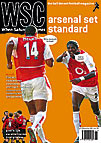 Any new football books out? Yes. Any good? No
Any new football books out? Yes. Any good? No
Good news for tree-lovers. Stung by all the bad publicity generated by Roy Keane’s score settling, Manchester United are to ban their players from producing books that don’t have the official stamp of approval. The millions keenly anticipating David Beckham’s planned autobiography needn’t fret as it seems set to escape the cull, contracts having been signed some time ago, but we may be deprived of the raw insights of Paul Scholes (working title: Ginger!) and Nicky Butt (Kicking Butt).
United are widely seen as trend setters in the game, so it will be a pity if other clubs don’t follow suit. While the book that has brought the issue to a head – Keane’s – is distinctly untypical of the genre, it would be doing us all a favour if it helped damp down the era of tabloid autobiographies.
That has given us rooms full of books written with serialisation in mind, just enough “controversial” revelations to stretch across a few spreads in a sports section as a taster for 250-odd pages of tedium. Few people apart from the publishers, the ghostwriters and the players themselves would be worse off if these “autobiographies” never saw the light of day, or were at least postponed until after the subject reaches the age of 30.
In a way it seems odd that it has taken clubs so long to wake up to the potential problems caused by such books. Manchester United already had cause to be uneasy about player biographies in the wake of Jaap Stam’s allegations about Alex Ferguson having made an illegal approach to him while under contract at PSV (not to mention his memorable description of the Neville brothers).
Stam’s departure itself may not have cost them the title last season, but it certainly put them in a pretty undignified position. Yet they again seemed blithely unconcerned about Keane’s book, which has led the FA to bring two charges of misconduct over his comments about Alf Inge Haaland. It seems hard to believe that senior United officials had seen the book before publication and not objected to its contents, as they have claimed. Either way, they stand to lose their most important player for several weeks, which is pretty careless by anyone’s standards.
Similarly, the Leeds board showed no desire to interfere with David O’Leary’s book, crassly titled Leeds United On Trial, which led to accusations of profiting from the Woodgate and Bowyer court case, the fallout from which may have helped bring about his still mysterious departure.
In one sense, of course, it is only right that players and managers should be afforded the freedom to speak out on controversial issues. But it is hard to avoid the thought that on the whole they are doing so to further line their own pockets rather than draw the football world’s attention to serious misdeeds.
The fact that they have the opportunity to do so is the result of the increased attention paid by all forms of the media to football in the past ten years or so, which has turned stars into celebrities and incidents into crises, but also of the particular development of the market in football literature – if you can call it that.
It would have seemed an odd thing to say 15 years ago, but there are now far too many football books of all descriptions being published, and players are by no means the only ones to blame. The relentless mining of the “autobiography” seam has now been joined by the over-exploitation of several other football gen-res, equally depressing if not more so.
One is fan-centred, split into two broad branches of “obsessive” and “hoolie”. This month marks the tenth anniversary of the publication of Fever Pitch. Through absolutely no fault of Nick Hornby’s, it has played a big role in the astonishing fact that even now there is still a market for books offering up the parallel (and almost without exception dreary) lives of fans and their teams for inspection. One particularly ominous title in this autumn’s lists even offers yet another “terrace take” on Arsenal – like we care. The persistence of the nostalgia books about Seventies violence is less surprising (though even more dispiriting) offering as it does the same kind of reliable thrill as pornography or WWF.
Football business books, too, seem to be pouring out in ever greater numbers, all the more so now that their authors can test the limits of the new genre of the “burst bubble”. Like the dotcom boom, being wise after the event is often more profitable than before it.
By contrast, other types of football book are still noticeable by their relative absence. Where, for example, is the range of investigative work that might provide the factual back-up to so many rumours of financial impropriety and prick a few inflated reputations? Still stuck in the gap between the hamstrung back-page reporter and the half-interested non-football press, that’s where, although one widely flagged title (by Robert Maxwell’s biographer Tom Bower) will hopefully buck that trend when it emerges.
Since WSC publishes books of its own, we are hardly in a position to bemoan the fact that the market for football titles of varying descriptions seems to have few limits to its expansion. It would be nice, however, if it explored a few new routes and closed down some of the old ones. Maybe Manchester United, for once, will help.
From WSC 189 November 2002. What was happening this month